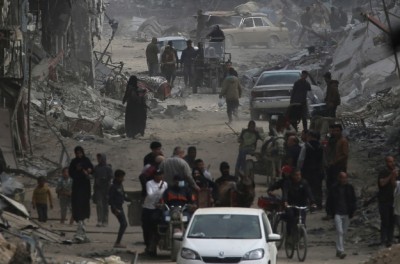Workers in high-risk industries will be asked to participate in a new Surveillance Testing Program as part of our defences against new coronavirus outbreaks, as we continue to take steps on the roadmap to reopening.
As case numbers decrease, the number of symptomatic tests will also decrease. Victoria is currently averaging approximately 12,000-15,000 tests on weekdays and 7,000-8,000 tests on weekend days. But as we take our safe and steady steps to reopening, finding and tracking cases of the virus is more important than ever.
That’s why we are doing even more to monitor sensitive settings – looking for positive cases before there’s any obvious sign of them – through a new surveillance program that aims to test 25 per cent of staff in a high-risk workplace each week.
Frontline industries have been critical in keeping Victoria going during the pandemic – they have kept our supermarket shelves stocked, our abattoirs working and delivering essential goods. Beginning with the food production sector, the Government will work with industry to ensure employees can get tested on a regular basis.
All medium and large employers in the meat, poultry, seafood processing and supermarket and refrigerated distribution sectors will be asked to ensure that a quarter of their workforces are tested each week. This applies to all workers operating from their work premises – and will lead to the majority of a workforce being tested over the course of a month.
Employees from high-risk industries can receive testing at one of our 200 testing sites from tomorrow, enabling workplaces to commence implementation over the next week. This includes community health respiratory clinics, hospital respiratory clinics and drive through testing facilities. The Rapid Response Testing Team will be able to undertake tests on site for remote and rural businesses by appointment.
After participating in the Surveillance Testing Program, employees are not required to self-isolate – however if they receive a positive result, they will need to isolate immediately and seek medical advice. Public Health teams will then support the workplace to determine any deep cleaning requirements, and to undergo contact tracing.
The Government will work with food supply industries over the coming days to establish testing requirements as the program expands over the coming weeks. The proportion of a workforce to be tested each week will be continually reviewed and will reflect the level of risk of virus transmission across our community and workplaces.
Another part of our virus detection work, wastewater testing, has detected viral fragments of coronavirus in wastewater taken from the sewer network at Anglesea yesterday.
While the preliminary result may not mean there are active cases of coronavirus in the Anglesea community, a testing blitz has commenced today, with locals with even the mildest symptoms encouraged to get tested and isolate as they wait for their result.
The positive trace of coronavirus was detected in a preliminary test result and then confirmed on Tuesday 29 September in a sample collected from the entry to a wastewater treatment plant on Tuesday 22 September.
The test result may be a result of someone with coronavirus infection who hasn’t been detected through testing. It could also be because someone who has previously been infected is continuing to “shed” the virus.
A pop-up testing site has been established at Anglesea Town Hall, 1B McMillan Street. It will be open from 11am to 6pm on Wednesday 30 September and from 10am to 6pm every day until Sunday.
Wastewater samples are taken from more than 30 sites across Victoria including Anglesea, which is one of 11 Barwon Water locations in Surf Coast, Colac-Otway and Greater Geelong.
Samples are also taken from regional wastewater treatment plants at Ararat, Ballarat, Benalla, Bendigo, Mildura, Moe, Shepparton, Swan Hill, Traralgon, Wangaratta, Warragul, Wodonga and Wonthaggi. Sampling will commence at Castlemaine from next week.
As stated by Premier Daniel Andrews
“As we take steps towards COVID Normal, our greatest tool to stop us going backwards is getting tested – our surveillance program will make sure we are leaving no stone unturned in tracking the virus.”
“By expanding the testing options – we are giving industry the tools they need to reopen as safely as possible.”







